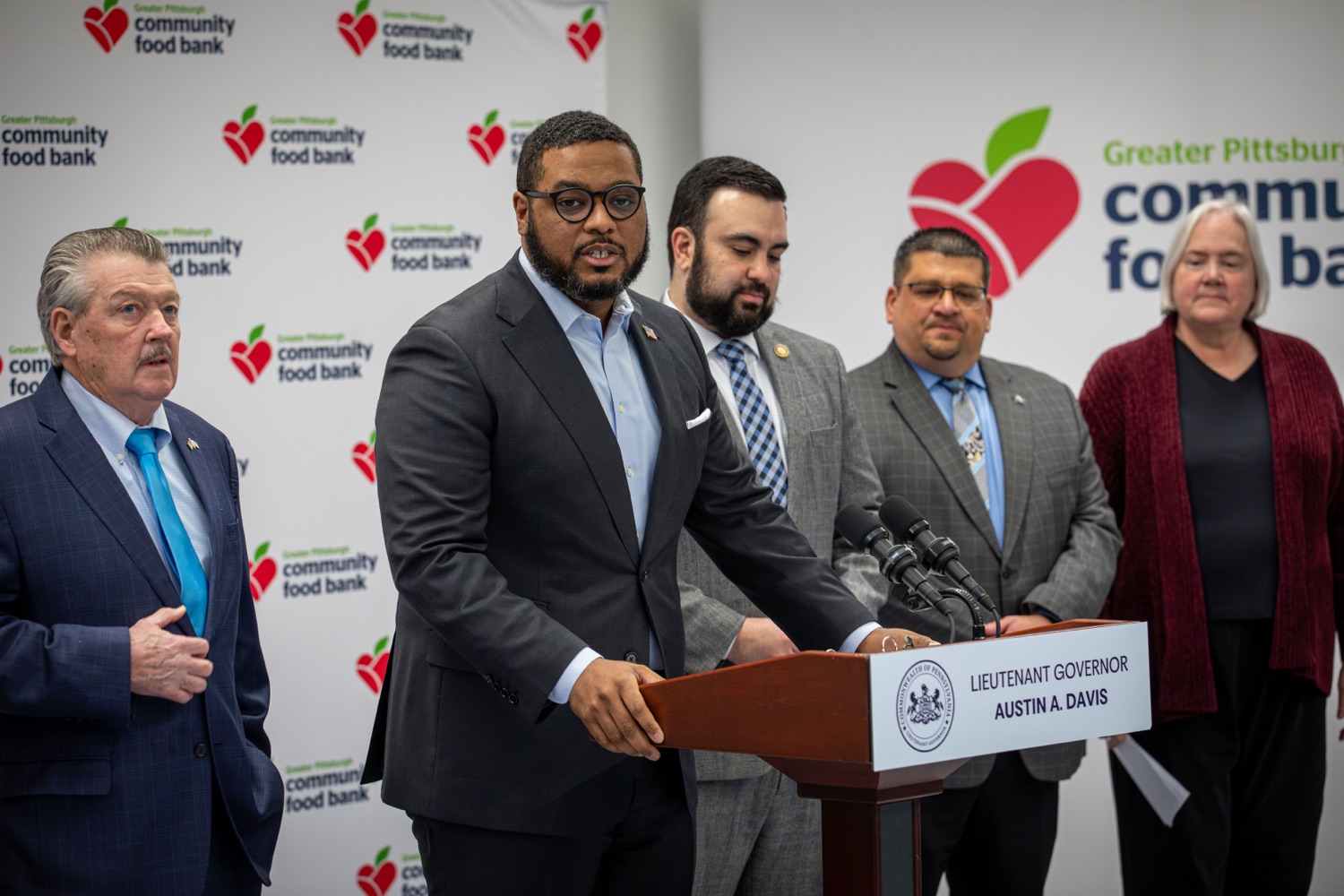Lieutenant Governor Austin Davis Highlights How Shapiro-Davis Budget Would Address Food Insecurity Across the Commonwealth
 Lt. Gov. Austin Davis visited the Greater Pittsburgh Community Food Bank today to emphasize how the Shapiro-Davis budget proposal would care for our most vulnerable Pennsylvanians and help feed seniors, people with disabilities and children.
Lt. Gov. Austin Davis visited the Greater Pittsburgh Community Food Bank today to emphasize how the Shapiro-Davis budget proposal would care for our most vulnerable Pennsylvanians and help feed seniors, people with disabilities and children.
“We can’t thrive as a Commonwealth if we are not caring for the most vulnerable among us, and our state budget makes it a priority to help Pennsylvanians who are dealing with hunger,” said Davis. “In last year’s budget, Governor Shapiro and I made free breakfast available for every public school student in Pennsylvania, and with this budget proposal we would make sure hungry kids have access to food during the summer months, as well. We’re also proposing to increase the minimum food assistance benefit for older Pennsylvanians and people with disabilities, helping 100,000 households deal with rising cost of groceries, and we want to boost food security programs through the state Department of Agriculture, which help support farmers and families in need.”
According to Feeding America, more than 1.2 million Pennsylvanians – including more than 325,000 children -- are dealing with hunger. That means 1 in 8 Pennsylvania kids face hunger.
The Shapiro-Davis budget plan would do the following:
- Increase the minimum Supplemental Nutrition Assistance Program (SNAP) benefit from $23 to $35 a month for seniors and people with disabilities (a $16 million state investment);
- Allocate $3 million in state funds to help feed Pennsylvania kids during the summer months;
- Dedicate $3 million to help reduce food insecurity, boost the Senior Food Box Program and reinforce the Pennsylvania Agricultural Surplus System.
“The need for food assistance in western Pennsylvania rivals what we saw during the peak of the pandemic. Our neighbors continue to struggle with higher prices for all household costs, which continues to put a strain on grocery budgets,” said Greater Pittsburgh Community Food Bank President and CEO Lisa Scales. “We are doing all we can to meet the need, but strong investments in state funding to ensure we have adequate food resources is critical. We call on our legislators across the Commonwealth to pass these critical investments in the final budget.”
The Greater Pittsburgh Community Food Bank serves Allegheny, Armstrong, Beaver, Butler, Cambria, Fayette, Greene, Indiana, Lawrence, Somerset and Washington counties, and it distributed nearly 42 million meals from July 2022 through June 2023.
“Governor Shapiro recognized that we have a complex food system and has shown his commitment to listening to the diverse voices and perspectives of those whose lives are fed and whose livelihoods depend on the system,” said Pennsylvania Food Policy Council Director Dawn Plummer. “As the new council’s first director, I have seen that commitment firsthand. The Governor’s new economic development strategy puts agriculture front and center, recognizing that our economic success as a state is dependent on our rural communities and our farmlands, as well as our cities and suburbs. His 2024-25 budget invests in families and businesses across the spectrum of our food system, no matter where they live or work.”
In an effort to bridge the gap between the Commonwealth’s agricultural industry and charitable food network, the Pennsylvania Agricultural Surplus System (PASS) was designed to help reduce waste of surplus product, support local farms and provide increased access to nutritious foods for Pennsylvania families who need it most. PASS distributed more than 4 million pounds of food during the 2022-23 fiscal year and is on track to distribute more than 5 million pounds in 2023-24. The Shapiro-Davis budget increased funding for PASS by $1 million.
“Older adults and people with disabilities are more likely to experience food insecurity, and these individuals are also more likely to have chronic health conditions like diabetes, heart disease, depression, and anxiety – all of which can cause or exacerbate other health complications or lead to death,” said Department of Human Services Chief Psychiatric Officer and Medical Director for the Office of Mental Health and Substance Abuse Services Dr. Dale Adair. “Food is so essential, and the Supplemental Nutrition Assistance Program is an investment in our basic health and dignity to make sure that all of us, no matter our circumstances, are able to eat and live well. The 2024-25 Shapiro-Davis budget seeks to build on this investment on behalf of Pennsylvanians.”
“Governor Shapiro’s and Lieutenant Governor Austin Davis’ budget is the most comprehensive, people-friendly budget in my 13 years in the Senate,” said state Sen. Jim Brewster. “I’m proud to continue working with them for the betterment of our great Commonwealth.”